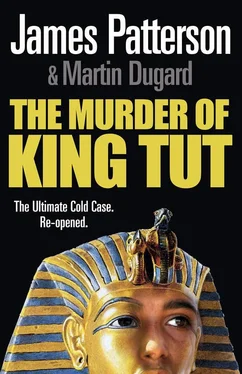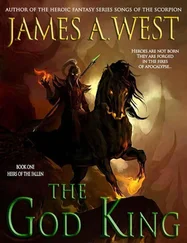But he said none of these things. Instead, Horemheb listened to the pharaoh drone on in his stupid, idealistic way.
“And we will. We will worship Aten, who will protect our borders. But I see no need to wage war. What is so wrong with being a peaceful nation?”
“I believe in peace through strength, sire. We know this works from long experience.”
“I would expect to hear nothing less from you, General. That is your job.”
“And what is strength if it is not wielded? May I ask you that?”
The pharaoh smiled in a most condescending manner. “General, when was the last time you spent a day just dreaming?”
Horemheb’s jaw nearly dropped off his head. “I beg your pardon?”
“You heard me. Do you ever write poetry? Do you ever lose yourself in thought? Have you ever completed a painting?”
“I am a warrior, sire. I am not trained to sit and think; I am trained to do.”
“Then do this.”
Akhenaten said nothing. Instead, he closed his eyes as if to meditate.
Horemheb waited until he could wait no longer. “Sire, what is it you would like me to do?”
“Relax. Take your mind off war. Egypt no longer needs conflict, for we are protected by the great sun god, who will provide for all our needs.”
And lead us to ruin, Horemheb thought angrily.
“You are dismissed,” said the pharaoh with a gentle wave of his hand. “Go write a poem.”
Amarna
1341 BC
“TUT. MY POOR TUT. What shall become of you?”
Nefertiti held her newborn son in her arms and feared for his life. Technically, the child was not her own, for he did not spring from her loins. But that idiot husband of hers with the wandering eye was the father, so the child might as well be the son of the queen.
The birth mother’s name was Kiya, and the pharaoh had given the pretty young harlot the title Greatly Beloved Wife, which placed her above even Nefertiti in esteem.
Kiya was-had been-a Mitannian princess named Tadukhepa, sent to Egypt by her father, as a peace treaty between the two nations. For three long years Nefertiti had endured the woman’s presence, watching her repeatedly take the queen’s place in the pharaoh’s bed. The man whom Nefertiti once loved had become a stranger to her, devoted to his beloved Aten and his child bride.
Why, the pharaoh had even begun telling people that he himself was Aten, that the pharaoh and the god were one and the same. It was Nefertiti who had the nerve to correct him, and for that he had cast her from his bed.
I am still the mother of his children, she reminded herself.
Yes, but all girls. This one, the son, will be the next pharaoh. I am no better than Tiye. When the pharaoh dies, the empire will fall to this child, this baby. And what will become of me?
What does it matter? There will be nothing left of the great Egyptian nation by the time my husband dies. That fool has seen to that.
The people of Egypt were starving and reverting to their nomadic ways, forsaking their farms and cities for a hardscrabble life on the move, all thanks to Akhenaten’s neglect or perhaps his insanity. The priests of Thebes wanted to kill him for usurping their gods with his own-and for asserting himself as a god. The royal vizier pretended to be a faithful servant, but once he got tired of Akhenaten’s preening, he too would want to stab the pharaoh in the back.
And what of Horemheb? Surely the general went to sleep each night and dreamed only of a military takeover.
So what stopped them? Could it be that they actually believed the pharaoh was a god? What fools men are. Or what liars.
The baby started to cry. Poor Tut.
Nefertiti was about to whisper to the child, telling him that at that very moment his mother was being placed inside her tomb. She had died giving birth, and Tut would never feel the comfort of her arms or suckle her bosom. But the time for such talk was past.
“Be still, my son,” Nefertiti said. “I am your mother now, and I will raise you to be the pharaoh your father should have been. You will be king. I promise you.”
Deir el-Bahri
1894
THE BLAZING SUN was beating down on Howard Carter’s neck. It was Ramadan, the Muslim holy month, which meant that dig season was over, since the men fasted during the day. This made them too weak to dig in the hot sun.
Now Carter, working alone, alternately photographed and sketched the northwest chamber of a newly excavated temple near Luxor. He was nineteen years old.
It was Carter’s second season excavating the structure dedicated to Hatshepsut, a female pharaoh nearly as famous as Nefertiti. It was a rocky location, situated at the base of a cliff, two miles from the Nile. Daytime temperatures often soared above 110 degrees Fahrenheit, and there was no shade.
Still, Carter worked dawn to dusk, in the fashion he had learned from Petrie, mainly because he so loved what he did. This was his life. There was nothing else for him.
His boss now was a Swiss named Edouard Naville. The prolific excavator had long believed that a vast temple complex lay beneath the soil at Deir el-Bahri, and the results of several seasons’ work were proving he might be correct.
Grand columns and towering walls now rose from the ground, unearthed after centuries of landslides and storms had covered them over.
Naville had been pleased with Carter’s growing professionalism but was also concerned that the young Englishman was too slow when it came to sketching and photographing. The same methodical bent that Petrie had once encouraged was now seen as a serious flaw.
But this cloud had a silver lining. Naville had requested a second artist to help Carter. The man hired for the task was none other than Carter’s thirty-year-old brother, Vernet.
The two had worked side by side through the early months of 1894, producing a series of dazzling sketches that were soon to be reproduced in book form.
Howard Carter had come a long way, actually. Not only had he learned to excavate, photograph, and supervise dig crews, but the young man was showing that his childhood sickliness was a thing of the past. When Naville closed the site for Ramadan, he asked the Carter brothers to continue working.
But the strapping Vernet fell prey to the heat and deprivation. He was forced to return to England, leaving his brother to finish Naville’s job alone.
Carter had enjoyed the time with Vernet, but he never once contemplated returning home with his brother.
The life of an Egyptologist had its perils to be sure. It wasn’t everyone’s idea of the ideal job. But for Howard Carter, it was paradise.
And one day, he hoped to be a modern-day king-in the Valley of the Kings. He dreamed of making the greatest tomb discovery of them all, even though he had no idea what it might be.
Deir el-Bahri
1899
THERE WAS NO SHADE to be had in the valley of Deir el-Bahri, not so much as a dancing speck. So as Carter set up his easel atop the ruins of an ancient and quite spectacular mortuary temple, the clock was ticking.
The rising March sun was just now lining the horizon. Within an hour, the heat of the day would get uncomfortable, and beads of sweat would drench Carter’s hatband.
Within two hours, his brushstrokes would dry almost as soon as he applied the watercolors.
And within three hours, the lead of his pencil would become too soft to sketch even a single line.
So he worked quickly, drawing the exterior of the temple, making sure that its massive proportions were in scale with the equally massive cliff rising like a great wall behind it.
The precision and symmetry of the sprawling complex, with three levels and sculpted columns, evoked images of an army of craftsmen, at the height of their talent, proudly building a structure that would last for all time.
Читать дальше












